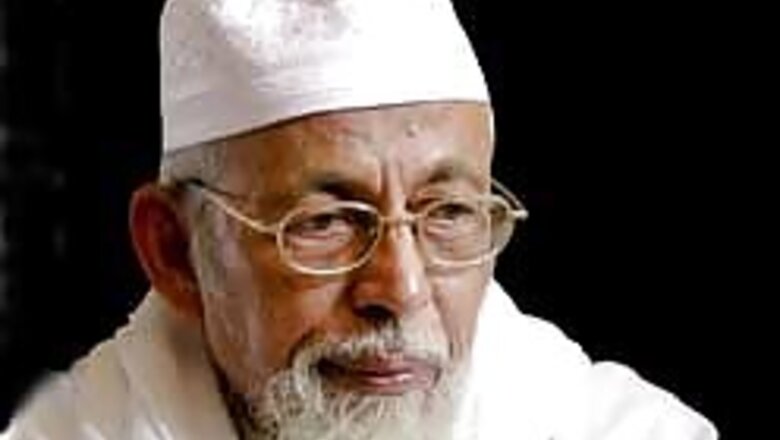
views
Jakarta: A reputed top leader of an al-Qaeda-linked terror group that has been blamed for the 2002 Bali bombings and other deadly attacks walked free from prison Wednesday to cries of ''God is great'' from cheering supporters.
Abu Bakar Bashir had served 26 months for conspiracy in the Bali bombings, which killed 202 people and thrust Indonesia, the world's most populous Muslim nation, onto the front lines of the war on terror.
''I thank Allah that I am free today,'' a smiling Bashir said after emerging from a scrum of supporters and journalists waiting outside the gates of Jakarta's Cipinang prison. ''I call on all Muslims to unite behind one goal, that is the implementation of Sharia law.''
Australia and the United States, which have accused Bashir of being a key member of Southeast Asian terror group Jemaah Islamiyah, said they were disappointed at his release, as did Australian victims of the Bali blasts.
''It's hard to imagine how a leader of a gang can get only two years for orchestrating to kill 200 people and injuring many more,'' said Peter Hughes, 46, who suffered burns to 56 percent of his body in the attack. ''It doesn't make sense''.
Brian Deegan, whose 21-year-old son Josh died in the bombings, called Bashir's 26-month sentence ''insulting''.
Eight-eighty of the Bali bombing fatalities were from Australia.
Jemaah Islamiyah is accused of carrying out church bombings across Indonesia in 2000, the 2002 Bali bombings, attacks in the Indonesian capital in 2003 and 2004, and a triple suicide bombing on Bali last October.
The attacks together killed more than 260 people.
Indonesian police say the group has received funds from al-Qaeda.
Bashir's freedom has raised concerns that he will energize Indonesia's small, Islamic radical fringe by making impassioned speeches at rallies and mosques, but few believe the stick-thin, softly spoken cleric will play any direct role in terrorism in the future.
Immediately after he was released, Bashir boarded a car to the central Javanese city of Solo, where his lawyers say he intends to begin teaching again at the boarding school he founded and which was attended by many of Indonesia's convicted terrorists.
PAGE_BREAK
Before the Bali blasts, Bashir was chiefly known for his vocal support of moves to make the secular country an Islamic state and his criticism of US policy toward Muslim countries. He has always maintained his innocence.
Indonesia's State Intelligence Agency chief, Syamsir Siregar, said he hoped Bashir would ''regain his self-awareness and be willing to cooperate with us.''
The leading expert on Jemaah Islamiyah said she didn't think his release would lead to more terror attacks, but added that Bashir was unlikely to help anti-terrorist investigators.
''I don't think it makes much difference whether he's released or stays in prison,'' said Sidney Jones, Jakarta-based director of the International Crisis Group. ''I think he will reinforce anti-Western feelings but I don't think he'll necessary push people over the line from radical rhetoric to violence.''
The US State Department expressed deep disappointment about what it called Bashir's light sentence. Spokesman Sean McCormack said Tuesday the court which convicted him concluded that he was a participant in ''a sinister conspiracy to cause a fire or explosion resulting in deaths.''
But, he said, it is up to Indonesians and the Indonesian courts to interpret their own laws.
Australian Prime Minister John Howard said he, too, felt disillusioned at the news of Bashir's release. ''Many Australians will see that particular outcome as an extremely disappointing result,'' Howard told Parliament, adding that he shared that sentiment.
Bashir was found guilty of blessing the 2002 Bali attacks, but cleared of more serious terrorist charges, including heading Jemaah Islamiyah.
However, Indonesian and foreign intelligence officers say he played a key role in setting up the terror group, and led it from 1999 to 2002. His al-Mukmin boarding school was attended by many people convicted in terror attacks in Indonesia, and remains notorious for its hardline syllabus.
No evidence has ever been presented linking him to the execution, preparation or commission of terror attacks, and most analysts agree he had little operational role within Jemaah Islamiyah after 2002, often describing him as a spiritual leader.
The turnout at the prison on Wednesday was small despite efforts by his supporters to rally a large crowd, and no mainstream Islamic figures or politicians were present, underscoring his small and isolated following.




















Comments
0 comment